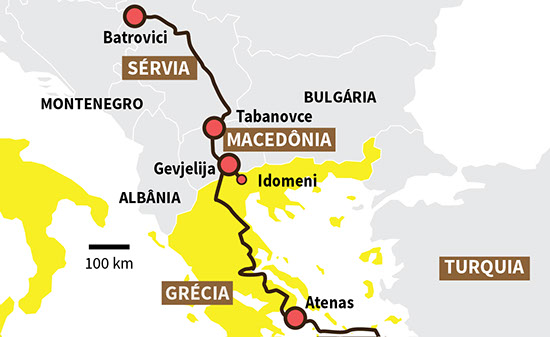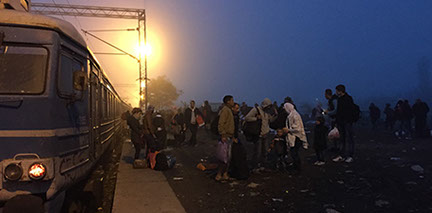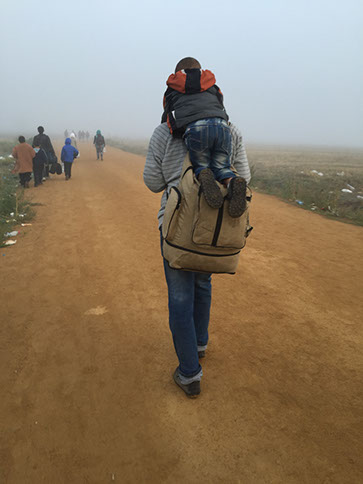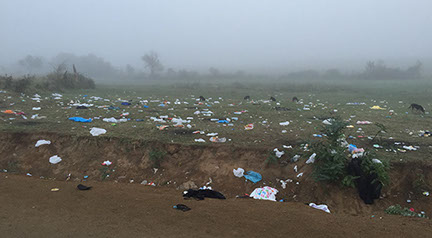Walking in Serbia
Refugees march on a dirt path surrounded by grass growing around the rail tracks. Not a typical European postcard.

Amist shrouds the skyline as the train opens its doors. Sunrise begins to shine on the Serbian border, at 5:48 am. Volunteers give food kits to the people coming out of the train. Scattered clothes lying on tables and on the ground are offered for those who need it. It is a help offer, but the scene is so chaotic that it looks bleak. Refugees rummage through the heaps of clothes lying on the dirt, looking for warm items. Starting their journey in hot weather, the group was caught unprepared by the low temperature of this early autumn. The mother puts the blankets that had covered the children on her back, and starts walking hand in hand with Mohammad. The father comes right behind, carrying the family backpack. Tala walks holding hands with her friend Musa. It doesn't matter that they didn't rest for two days. There is no stop.
The dirt path surrounded by the grass that flanks the railroad tracks in no way resembles the Europe we see on postcards. The path is littered with thousands of plastic bottles and food packages, traces of the people who have traveled before. With the weight of backpacks burdening their shoulders, what is no longer needed is discarded along the way. At the border with Serbia, the police ask that all backpacks be scanned by an X-ray machine, just like airports do. No one asks for documents, but everyone needs to go through the procedure, to prevent terrorists from getting into the country. A few meters ahead, there are four chemical toilets with a strong smell of human waste available to migrants.
We are still far from our destination. It will take a two-hour walk. Ghazi carries Mohammad on his back, along with his backpack. At midpoint, feeling tired, he puts the child on the ground. Mohammad cries. He wants to go back up. Ghazi insists. After two sleepless nights, his body begins to show signs of fatigue.
In the middle of the way, the uncle of the children shouts:
“We're on the wrong direction!”
They all stop and look back with frightened faces.
“I'm just kidding” Adham jokes.
Everyone laughs. He just wanted the group to wait for him: he had fallen behind in the hike. By telling jokes like this, which are repeated along the way heading north, the group tries to lighten the most difficult times.
As the group approaches the urban areas of Serbia, houses begin to emerge on the horizon. Most of them have two floors, colorful paint and chimneys.
”They are so pretty” Razan says.
Halfway in the walk, the first Serbian taxis show up, offering transportation to the bus station.
“Taxi direct! Taxi, my friend! To bus station!”
Ghazi ignores the offers. He wants to keep the group together. A few minutes later, we stop to eat at a sidewalk. Everyone is exhausted and hungry. The taxi drivers remain determined:
”Ten euros per person, ten euros.”
After a 15 minute break, the pilgrimage continues. We pass through a Muslim neighborhood where boys shout Arabic greetings from the sidewalk:
“Salaam-u-aleikum (Peace be upon you).”
O lixo emoldura o trajeto, com milhares de garrafas plásticas e embalagens de comida
The street narrows into a curve where cars pass at full speed, honking. Suddenly, Mohammad moves away from his mother's arms and is almost hit by a car. The father jumps from the scare, screams, and brings the boy closer to him.
The walk seems endless. All the people are pushed to the limits of patience and physical strength. I ask Ghazi how long it will take. He guesses a kilometer. Minutes later, he makes the question to police officers who patrol the area without caring about refugees.
“Five kilometers” they say.
Then, the group reaches a slope. Their backpacks weigh them down. The children are crying. They don't want to walk anymore.
Tala asks Musa to carry her on his shoulders. His arm has been injured since he left Kos, but he carries her for most of the walk.
After almost two and a half hours of walking, the driver of a red pickup truck offers the family a ride to the bus station. Ghazi accepts it, but under the condition that the driver will take all the people from the group. He hesitates, thinking it was just the couple and their children. Before he has the chance to say no, everyone hops in.
The young men make jokes, saying that the driver is taking them to the gallows. Everyone laughs, but it's only a half-joke. One of them, Omar, takes out of his backpack a taser gun that he carries with him. Hard-pressed by the war, they are always vigilant.
Thanks to the ride, we arrive at the bus station in ten minutes. It's 8:16 am on September 23rd. Four buses are lined up on arrival, while taxi drivers try to sell a ride to the train station. The Iraqi believes it's a good idea, but Ghazi tells him off.
“I'm the one who knows about Syria” he says.
Ghazi closes the deal on a bus trip for that will take us to the border between Serbia and Croatia. It will cost 60 euros per person. At the beginning of the journey, he had entertained the idea of taking the Hungarian route, but news about closed borders and police brutality made him change his mind.
One of the organizers of the tour wears a jacket with colorful flowers and a pair of army camouflage pants. Ammar, the former soldier, is the one who collects the money from the people in the group.
An hour later, the bus leaves the station. Everyone sleeps, exhausted from the previous night on the train and the morning walk. Three hours later, the bus stops in the middle of the road with mechanical problems. Some passengers try to step out of the bus, but the organizers won't allow it. They don't want to draw attention to a bus full of refugees, fearing that some document checking might stop them from continuing the trip. It's early afternoon and the sun is directly overhead, which makes the smell of sweat permeate the bus and its grey, old-looking seats.
I ask Ammar how long it will take to get to Germany.
“About six days… or six months… or six years. You'll go back to Brazil as an old lady” he laughs.
At least four refugees' buses are in front of us by the time we reach the border between Serbia and Croatia. It's 6:30 PM of Wednesday, September 23th. Ghazi wakes Mohammad and puts on his jacket. The child cries. We walk for 20 minutes to the spot where volunteers offer help. There are different tents providing assistance with clothing for the children and blankets of the High Commissioner of United Nations for Refugees (UNHCR). They are given boxes with children's clothes, canned sardines and water bottles.
“There are many people waiting, you people need to be patient. They are letting people in little by little. No one knows how long it’s going to take.” warns one of the volunteers, wearing a vest for identification.


